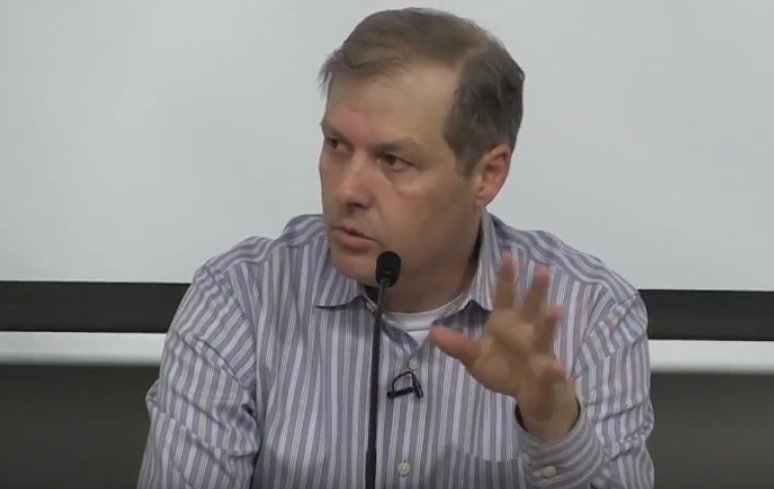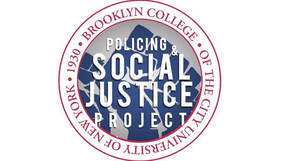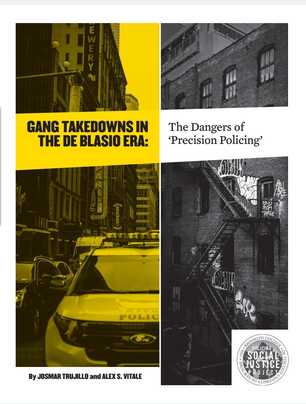|
Alex S. Vitale is Professor of Sociology and Coordinator of the Policing and Social Justice Project at Brooklyn College and the CUNY Graduate Center, He has spent the last 30 years writing about policing and consults community based movements, human and civil rights organizations, and governments internationally. Prof. Vitale is the author of City of Disorder: How the Quality of Life Campaign Transformed New York Politics and The End of Policing. His academic writings on policing have appeared in Policing and Society, Police Practice and Research, Mobilization, and Contemporary Sociology. He is also a frequent essayist, whose writings have been published in The NY Times, Washington Post, The Guardian, The Nation, Vice News, Fortune, and USA Today. He has also appeared on CNN, MSNBC, CNBC, NPR, PBS, Democracy Now, and The Daily Show with Trevor Noah.
Upcoming AppearancesNov. 1, Sociology Department Colloquium, University of Chicago. 12:30 PM CT.* Nov. 2, University of Illinois Chicago, 2PM CT* Nov. 2, Book Launch event for Julian Go's Policing Empires. Seminary Coop Bookstore. 6PM CT* Nov. 8, Abolitionist Training, SF Public Defenders Office. 12 PT Nov. 15, "Reimagining Safety" Screening, Fallser Club, Philadelphia, 6:30 PM * Nov. 16, The Horror of Police, American Society of Criminology, Philadelphia. 12:30* Nov 17, ASC Presidential Panel w Larry Krasner, American Society of Criminology, Philadelphia. 12:30* Nov 18, Critical Criminology-Community networking event, Philadelphia, 7 PM* December 6, Reimagining Public Safety Screening and Panel. John Jay College, 1:30 PM* March 7, "Reimagining Safety" Screening, Institute of Contemporary Art, Portland, OR.* March 8, Portland State University, 1 PM PT* March 9, Keynote Address, Institute of Contemporary Art, Portland, OR.* March 28-29, Paris * In person Past Events |
The Policing and Social Justice Project |
Television Appearances
|
|
Click to set custom HTML
|
.
Reviews of The End of Policing
Shuck the Police: Are We Done with Traditional Law Enforcement? LA Review of Books
The End of Policing’s great strength lies in demonstrating that if the shape of American policing is historical, it is also contingent. We could have made different choices regarding how we set about securing the public against the array of threats that confront it, and — refreshingly, at this moment of general despair — Vitale believes we still can.
What to Do About the Police? The Nation
The End of Policing offers a compelling digest of the dynamics of crime and law enforcement, and a polemic against the militarization of everything.
What I Can't Live Without by Rachel Kushner. New York Magazine
Remember Ferguson? Who among my peers in the literary world was up for supporting the rioters? I wondered too. In any case, what’s happened since has been more abuses, more killings of unarmed citizens, and no reforms to date. Unfortunately no increased diversity on police forces, nor body cameras, nor better training, has made any seeming difference. We need to restructure our society and put resources into communities themselves, an argument Alex Vitale makes very persuasively.
The End of Policing. Race and Class
Impressively researched and thoroughly readable, The End of Policing shatters the myth that police in the US protect and serve the population through their handling of social issues like homelessness, unemployment, drug use and violence, as a way to create a ‘better’ society. Rather, Vitale argues that policing is ‘a tool for managing deeply entrenched inequalities’ that are organised along the intersecting terrains of race, class, gender and sexuality. This convincing critique of law enforcement underpins Vitale’s view that ‘any real agenda for police reform must look to replace police with empowered communities working to solve their own problems’.
The End of Policing. Policing: A Journal of Policy and Practice
Given the importance of the argument, the book can be readily defended as a basis for further research and debate. Each of the chapters is well-suited to use in an academic setting as the basis for an extended study of the issues raised. In this regard, The End of Policing should be considered compulsory reading for those interested in the future of the police.
The End of Policing. Kirkus Reviews
"In a tightly constructed monograph filled with reform suggestions, Vitale decries the evolution of police agencies as tools of the white establishment to suppress dissatisfaction among the have-nots. The author understands the role of police in trying to solve violent crimes such as rapes and homicides, but he believes police should no longer serve as the chief combatants against narcotics use, street gangs, border patrol, prostitution between consenting adults, homelessness, mental illness, and misbehaving adolescents. Instead, Vitale suggests either decriminalization of certain behaviors or non–law enforcement solutions, such as government agencies and private organizations that could, for example, work with the homeless to provide them with permanent shelter. A clearly argued, sure-to-be-controversial book."
The End of Policing? The Crime Report
In The End of Policing, Vitale offers a different framework for thinking about how law enforcement relates to the communities it serves. In a chat with TCR’s Isidoro Rodriguez, he explains why the current policing model perpetuates racial bias, why he believes community policing is misconceived, and what he means by the provocative title he chose for his book.
The End of Policing - book review. Counterpoint.
Vitale doesn’t just highlight the problems, but offers solutions. He stresses that in order to address the underlying issues, a political response is necessary. Rather than treating social issues through coercive measures, the root causes need to be dealt with: in most cases, the real problem is an economic system that produces inequality and hollows out democracy.
The End of Policing: A New Book on the Problem of Policing. Black Perspectives
This post is part of our blog series that announces the publication of selected new books in African American History and African Diaspora Studies.
When Police are the Problem. Public Books
Considering the scope of its polemical argument and attention to detail, The End of Policing is impressively brief; it is is exactly the sort of introduction to the problem of policing that we have needed.
The End of Policing. Socialist Review
Alex Vitale condemns the politics of austerity for creating the circumstances in which heavy-handed policing becomes the accepted means of controlling a poor, marginalised majority in a system which exists to serve the 1%. Chapters on mental health, homelessness, sex work, drugs and border policing illustrate the way in which the system persecutes and fails those who need the most help and the increasing impossibility of accessing services without going through the cycle of the criminal justice system.
Review: The End of Policing. NetPol, The Network for Police Monitoring
‘The End of Policing’ looks in detail at a number of the key issues that dominate the debate about crime in the US, including the various wars on drugs, terror, vice, gangs and homelessness. In each case, he argues that after years of neo-liberal austerity, there is compelling evidence that “local governments have no will or ability to pursue the kind of ameliorative social policies that address crime and disorder”. Instead, because “political leaders have embraced a neoconservative politics that sees all social problems as police problems”, the response has been to harass, arrest and imprison those who are themselves the most likely to become victims of street crime: people from poor, working class and especially black neighbourhoods.
Radio Interviews and Podcasts
We must end policing as we know it with Alex Vitale. The Dig
In his new book The End of Policing Brooklyn College sociologist @avitale makes the case that technocratic reforms won't fix American policing. In reality, we can only fix policing by ending the carceral state and defeating neoliberalism.
Policing in a Time of Austerity. Against the Grain
Crime is way down, and law and order advocates argue that’s the result of expanded policing and other punitive measures. But sociologist Alex Vitale says there’s no evidence that’s true. He discusses how expanded policing is the flip side of neoliberal economic austerity and the slashing of social services.
‘If We Don’t Change the Mission of Police, Reforms Will Not Work.’ CounterSpin
Janine Jackson interviews Alex Vitale about de-policing and his new book The End of Policing for CounterSpin radio.
The End Of Policing: A conversation with Alex Vitale. Verso
The expansion of police authority is inconsistent with community empowerment, social justice—even public safety. Law enforcement has come to exacerbate the very problems it is supposed to solve. The best solution to bad policing may be an end to policing.
Alex Vitale - The End of Policing (In Conversation). Upstream
In this Upstream Conversation we spoke with author Alex S. Vitale about his new book, “The End of Policing.”
Confronting the American Way of Policing. CUNY Booktalk
Alex Vitale has been an impassioned advocate of police reform for 25 years, and now the Brooklyn College sociologist is making waves with his new book, The End of Policing. Vitale, who runs the Policing and Social Justice Project at the college, argues that police in recent decades have taken on an expanded, intensified and largely unchecked role in American society – a fundamental change fed by a “warrior mentality” that he says damages the country as much as it protects it.
Alex Vitale: The End of Policing. The Katie Halper Show
We talk to Alex Vitale about his book The End of Policing.
The End of Policing, Featuring Alex Vitale. Beyond Prisons
Professor Alex S. Vitale joins the Beyond Prisons podcast to discuss his book, “The End Of Policing,” which provides a historical analysis of law enforcement and police reform in the United States and argues for alternatives.
News Coverage
Tiffany Cabán Upends Politics As Usual in Queens. The New Yorker
There was Alex Vitale, a Brooklyn College professor and the author of “The End of Policing,” who had brought along a friend, a judge from Texas named Franklin Bynum. (Last year, Bynum was one of two D.S.A. members who won judgeships in Houston. If Cabán won, Bynum declared, she would be “the first D.S.A. D.A.”)
Trump Already Has a Wall. It’s the Thin Blue Line. The New Republic
"The fact that violent crackdowns on protesters, rough treatment for criminal suspects, and brutal mistreatment of immigrants are seen as simply prerogatives of the police is indicative of “a fundamental crisis in police legitimacy,” writes sociologist Alex Vitale in his forthcoming book, The End of Policing."
To Protect And To Serve? Alex S. Vitale On The Overpolicing Of America. Sun Magazine
"Vitale tells audiences that, when we believe inequality is a result of some people working harder or being smarter than others, “we erase the history of exploitation and the ways the game is rigged to prevent economic and social mobility. When people complain about these realities, they are told it’s their own fault, that they didn’t try hard enough to be part of the glorious ‘one percent.’ ”
Men are pretending to be cops and targeting sex workers. Think Progress
“Any enforcement, whether it is targeting customers or providers, is going to exacerbate all these problems that go with having an underground economy. These workers don’t have any legally enforceable rights, essentially making them vulnerable to exploitation and abuse,” Vitale said.
Envisioning an America Free from Police Violence and Control. The Intercept
In “The End of Policing,” Alex S. Vitale argues that police reforms implemented in the wake of Brown’s death — from diversity initiatives to community policing to body cameras — fail to acknowledge that policing as an institution reinforces race and class inequalities by design.
4 Disabled People Dead in Another Week of Police Brutality. The Nation
Alex S. Vitale, author of The End of Policing, told me that, beyond the issues of disability and policing, “This all starts as a self-directed search for drugs. And since drugs are conceived of as automatically dangerous and illegal, the police approach people as dangerous and a threat to be controlled. As soon as the young person said, ‘I’m fine,’ that should have been the end of it.”
Activists urge inspector general to probe NYPD's gang policing tactics. NY Daily News
“The NYPD has not been very forthcoming about the tactics that they're using as the basis for these investigations, the outcomes of the cases, et cetera,” Alex Vitale, a Brooklyn College sociology professor who signed off on the letter. “What we're doing today is we're trying to get more information.”
The Term ‘Terrorism’ Is a State Weapon. The Nation
“I’d like to hear more about how calling it terrorism ends up making us safer? Will it lead to weapons ban or just more aggressive policing?” asked Alex Vitale, professor of sociology at Brooklyn College and author of The End of Policing, in response to a tweet that stated, “#stephenpaddock is a terrorist.” Vitale, when met with predictable and reasonable replies about racist double standards, replied, “do we really want to feed the ‘terrorism’ machine? Esp[ecially] with Trump.” Vitale makes a good point: The interpellation of “terrorist” has a fierce history of promoting a repressive and military state apparatus, not justice.
The New Horsemen: How American Riot Police Embraced the Bicycle.The Guardian
In the 1980s, policing took another turn with the era of “community policing”. This was “about restoring police legitimacy after the civil unrest of the 1960s and 1970s, and the professional isolation of police,” says Alex Vitale, a sociology teacher at Brooklyn College and author of the forthcoming book The End of Policing.
Police Turn Body Cams into Tools for Public Relations, not Accountability. Columbia Journalism Review
“What we’re seeing in practice on the ground is that even though body cams were sold to us as a police accountability tool, they’re really being used for public relations purposes, to make the police look good,” says Alex Vitale, Brooklyn College sociologist and author of “The End of Policing.” “The media should be asking for unedited footage and should be demanding access to footage that plays a role in accountability, not in PR.”
Essays and Op/Eds
The New ‘Superpredator’ Myth. The New York Times.
When community-based alternatives are well funded and well operated, they can make a real difference in reducing gun violence. Though no one program will solve all of our violence problems, it’s time to dial back the criminalization approach and give communities the resources they need to create lasting public safety.
Trump Is Trying to Militarize the Police. It Won’t Make Us Any Safer. Fortune Magazine.
It’s time to take a much bigger step to end police militarization than the changes implemented by the Obama administration. The 1033 and Terrorism Grants programs should be abandoned or completely rethought. Given the catastrophe in Houston this week, it’s clear that what local officials really need from the federal government to enhance public safety are high-water vehicles and swift water rescue boats, not tanks and bayonets.
Jail workers should get on the Rikers closure bandwagon: The old facility is awful for them, too. NY Daily News.
It’s time for COBA, SEIU 1199, DC 37, and other unions that represent workers at Rikers Island to acknowledge that change is coming and take steps to protect their members’ long-term interests, rather than fighting a losing battle to defend an institution whose time has run out.
Abolish the Drug Enforcement Administration. The Nation.
The use of police to wage a war on drugs has been a nightmare. Not only have the police failed to reduce drug use and the harm it produces, they have actually worsened those harms and destroyed the lives of millions of Americans through pointless criminalization. Ultimately, we must create robust public-health programs and economic-development strategies to reduce demand and help people manage their drug problems in ways that reduce harm—while keeping in mind that most drug users are not addicts.
Do the math: More arrests will fill the jail, not close it. SF Examiner.
Expanded policing and prosecution don’t stop the revolving door of imprisonment, they just speed up the door’s motor. The jail at 850 Bryant will only close once The City stops targeting people to fill it.
Houston Police Want to Target Gang Violence, It Won't Work." Houston Chronicle.
This evidence shows us that when community-based alternatives are well-funded and well-operated they can make a real difference in reducing violence. While no one program will solve all our violence problems, it’s time to dial back the criminalization approach and give communities the resources they need to create lasting public safety without relying on mass incarceration.
Police and the Liberal Fantasy. Jacobin.
Body cameras and more training aren't enough. We need to divert funding for police into funding for human needs.
Lectures
|
|
|



